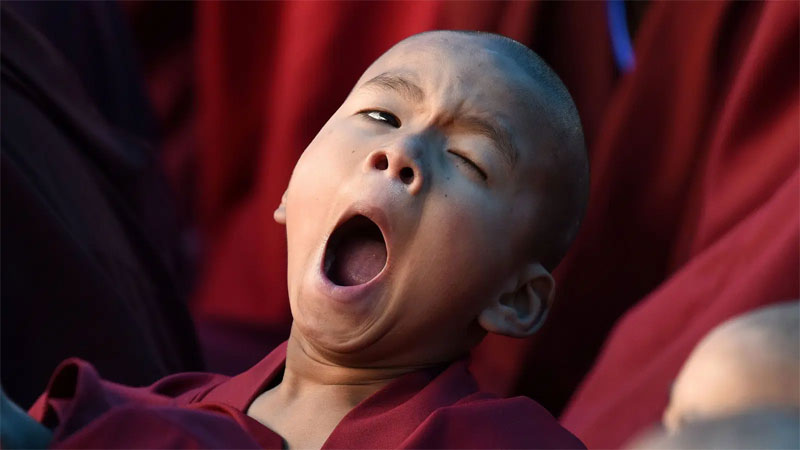 The act of opening the mouth wide without conscious control and slowly releasing a deep breath, usually a sign of tiredness or boredom.
The act of opening the mouth wide without conscious control and slowly releasing a deep breath, usually a sign of tiredness or boredom.
Reflex, usually triggered by boredom, fatigue, drowsiness, or seeing someone else yawn; the mouth is opened wide and air is drawn in and released slowly.
Involuntary deep inhalation of air with the mouth open. Although its exact purpose is unclear, yawning frequently occurs at the same time as stretching and is usually caused by drowsiness, fatigue, or boredom. It is also often caused by suggestion — if an individual sees another person yawning, he or she may yawn as well. Repeated yawning is usually a sign of drowsiness, but it may also be a sign of depression.
A reflex action in which the mouth is opened wide and air is drawn into the lungs then slowly released. It is a result of drowsiness, fatigue, or boredom.
An involuntary opening of the mouth, which is accompanied by marked dilatation of the pharynx, a characteristic distortion of the face and usually stretching of the limbs. The cause and function of yawning are quite obscure. It is usually a sign of drowsiness or boredom, but it it may be the result of raised concentrations of carbon dioxide (CO2) in the blood the physiological aim being to cut the amount of CO2 and raise the level of oxygen in the blood.
Deep inspiration with the mouth wide open. It is associated with drowsiness, boredom, anxiety, or fatigue.
An automatic response, known as a reflex action, typically linked to feelings of drowsiness or boredom. It involves the mouth opening widely and a slow, deep breath being drawn in. Yawning often results in a brief rise in heart rate and, in many instances, watery eyes.
The reason for yawning remains a mystery, yet one hypothesis proposes that it may be prompted by elevated levels of carbon dioxide in the bloodstream. Consequently, its potential purpose might involve lowering carbon dioxide levels and elevating oxygen levels in the blood.
